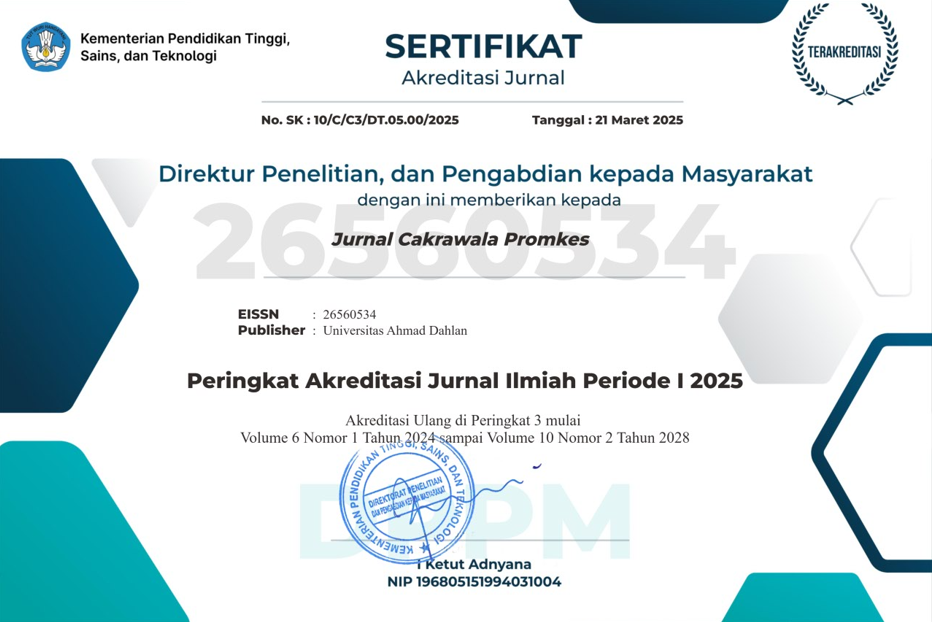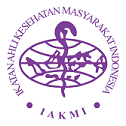Analisis Strategi Coping Stress Saat Pembelajran Online Selama Masa Pandemi Pada Siswa SMA Negeri 4 Pandeglang
DOI:
https://doi.org/10.12928/promkes.v4i2.6206Keywords:
Kualitatif, Pandemi COVID-19, Pembelajaran Online, Coping StressAbstract
The outbreak of the corona virus pandemic in Indonesia has prompted the government to issue a policy to implement online learning. Online learning carried out in a pandemic condition triggers stress among students. This study aims to analyze the stress coping used by students of SMA Negeri 4 Pandeglang when going online. The research method used is qualitative with a phenomenological approach. Informants in this study were students of SMA Negeri 4 Pandeglang class XI and XII who met the inclusion criteria. Based on the data that has been obtained, it is known that the stress experienced by students is triggered by various factors, including more school assignments than offline meetings, difficulty understanding school materials, unfavorable home environment, unstable internet signal and limited internet quota. Stress coping strategies that are applied by students in managing stress include coping that focuses on problems and coping that focuses on emotions. Students experience stress reactions (starin) in the form of physical and psychological reactions when faced with academic demands in online learning
References
Kemenkes RI, Pedoman Pencegahan dan Pengendalian Coronavirus Disease (COVID-19), Jakaeta: Kementrian Kesehatan RI, 2020.
A. K. Watnaya, M. H. Muiz, N. Sumarni, A. S. Mansyur and q. Y. Zaqiah, "Pengaruh Teknologi Pembelajaran Kuliah Online Di Era Covid-19 Dan Dampaknya Terhadap Mental Mahasiswa," EduTeach: Jurnal Edukasi dan Teknologi Pembelajaran, vol. 1, no. 2, pp. 153-165, 2020.
A. Sadikin and A. Hamidah, "Pembelajaran Daring di Tengah Wabah Covid-19," BIODIK: Jurnal Ilmiah Pendidikan Biologi, vol. 6, no. 2, pp. 214-224, 2020.
Z. Hanifah, H. Lutfia, U. Ramadhia and R. S. Purna, "Strategi Coping Stress Saat Kuliah Daring Pada Mahasiswa Psikologi Angkatan 2019 Universitas Andalas," Jurnal Psikologi Tabularasa, vol. 15, no. 1, pp. 29-43, 2020.
N. K. Suryani, I. A. P. W. Sugianingrat and K. D. I. S. Laksemini, Kinerja Sumber Daya Manusia: Teori, Aplikasi, dan Peneliian, Denpasar: Nilacakra, 2020.
A. Kurniawan and I. Y. Cahyanti, "Hubungan Antara Academic Stress Dengan Smartphone Pada Mahasiswa Pengguna Smartphone," Psikologi Klinis dan Kesehatan Mental, vol. 2, no. 1, pp. 16-21, 2013.
M. Barseli, Ifdil and Nikmarizal, "Konsep Stres Akademik Siswa," Jurnal Konseing dan Pendidikan, vol. 5, no. 3, pp. 143-148, 2017.
T. Safaria, "Peran Religious Coping Sebagai Moderator Dari Job Insecurity Terhadap Stres Kerja Pada Staf Akademik," Humanitis: Indnesian Psychological Journal, vol. 2, no. 155-170, p. 8, 2011.
S. Maryam, "Strategi Coping : Teori Dan Sumberdayanya," JURKAM: Jurnal Konseling Andi Matappa, vol. 1, no. 2, pp. 101-107, 2017.
E. P. Sarafino and T. W. Smith, Health Psychology: Biopsychosocial Interactions, 7th ed., New York: John Wiey & Sons, inc, 2012.
Y. Jatira and Neviyarni, "Fenomena Stress dan Pembiasaan Belajar Daring Dimasa Pandemi Covid-19," Edukatif : Jurnal Ilmu Pendidikan, vol. 3, no. 1, pp. 35-43, 2021.
H. Aswat, E. R. Sari, R. Aprilia, A. Fadli and Milda, "Implikasi Distance Learning diMasa Pandemi COVID 19 terhadap Kecerdasan Emosional Anak di Sekolah Dasar," Jurnal Basicedu, vol. 5, no. 2, pp. 761-771, 2021.
D. H. Oktawirawan, "Faktor Pemicu Kecemasan Siswa dalam Melakukan Pembelajaran Daring di Masa Pandemi Covid-19," Jurnal Ilmia Universitas Batanghari Jambi, vol. 20, no. 2, pp. 541-544, 2020.
M. Fikri, M. Z. Ananda, N. Faizah, R. Rahmani, S. A. Elian and A. Suryanda, "Kendala Dalam Pembelajaran Jarak Jauh di Masa Pandemi Covid-19: Sebuah Kajian Kritis," Jurnal Educational and Development, vol. 9, no. 1, pp. 145-148, 2021.
A. Widiyono, "Efektifitas Perkuliahan Daring (Online) pada Mahasiswa PGSD di Saat Pandemi Covid 19," Jurnal Pendidikan, vol. 8, no. 2, pp. 169-177, 2020.
Downloads
Published
Issue
Section
License
Copyright (c) 2022 Febrianti Putri Nurulita

This work is licensed under a Creative Commons Attribution-ShareAlike 4.0 International License.
Authors who publish with JCP: Jurnal Cakrawala Promkes agree to the following terms:
- Authors retain copyright and grant the journal the right of first publication with the work simultaneously licensed under a Creative Commons Attribution License (CC BY-SA 4.0) that allows others to share the work with an acknowledgement of the work's authorship and initial publication in this journal.
- Authors are able to enter into separate, additional contractual arrangements for the non-exclusive distribution of the journal's published version of the work (e.g., post it to an institutional repository or publish it in a book), with an acknowledgement of its initial publication in this journal.
- Authors are permitted and encouraged to post their work online (e.g., in institutional repositories or on their website) prior to and during the submission process, as it can lead to productive exchanges, as well as earlier and greater citation of published work.

This work is licensed under a Creative Commons Attribution-ShareAlike 4.0 International License












